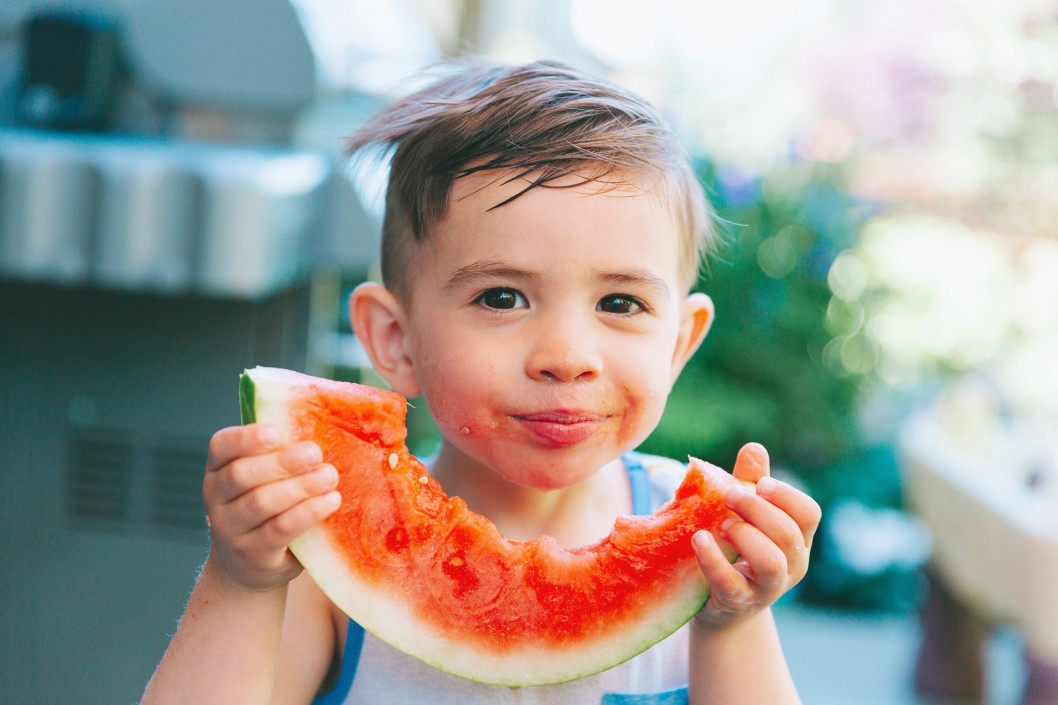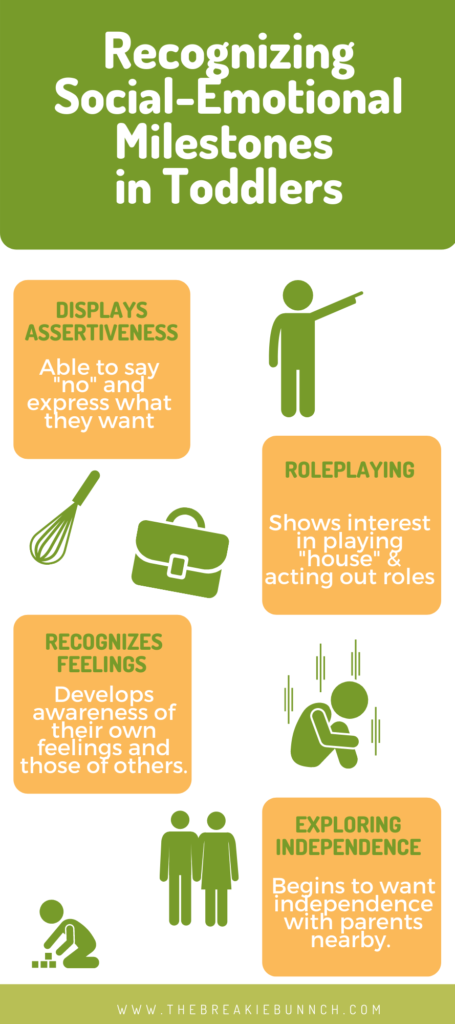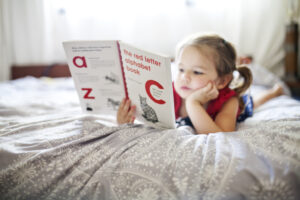As babies learn, grow, and turn into toddlers, they develop in various areas, including:
- Cognitive Development – Learning and problem solving
- Social-Emotional Development – Interacting with others and managing emotions
- Speech and Language Development – Using words in sentences and conversations
- Fine Motor Skills Development – Feeding themselves and drawing
- Gross Motor Skills Development – Walking, running and climbing
All areas of development are essential, and some are more obvious than others. It’s hard to miss when your baby becomes a toddler by taking his first steps! Some areas of your toddler’s development are a little more abstract and harder to notice. One of these areas is social-emotional development.
Social-emotional development begins from birth through watching and interacting with parents, siblings, and caregivers. When your child reaches about two years old, children’s social-emotional skills start to take off. They start to interact more with peers, experience more emotions and engage in pretend play.
Early Social-Emotional Developments
Between the ages of one and two years old, your baby will:
- Recognize his reflection in the mirror or a photograph, and often smile at himself in the mirror.
- Begin to say “no,” and resist requests like bedtime and meals.
- Imitate adults’ words and actions, like cleaning.
- Understand and respond to commands.
- Show affection to familiar people with hugs and kisses.
- Show things to other people, like his favorite stuffed animal.
- Begin to feel jealous when he’s not the center of attention.
- Show frustration easily.
- Show some interest in independence.
- Share food.
- Develop a range of emotions and start to manipulate parents with fake tears, etc.
Toddler Social-Emotional Development
By the time your toddler is getting ready to begin preschool, he should be demonstrating these social-emotional skills:
- Say “no” and being assertive about what he wants.
- Begin to show awareness surrounding his and other’s feelings.
- Display rapid shifts in mood.
- Show fear in some situations like the dark.
- Display signs of shyness.
- Become frustrated and even aggressive in some situations.
- Resist change.
- Want independence while still wanting parents nearby.
- Desire routine.
- Watch other children as they play.
- Become defensive of his toys and other possessions.
- Start to play “house.”
- Begin to feel comfortable with some separation from parents.
- Begin to demonstrate empathy for others.
When to be Concerned About Your Toddler’s Social-Emotional Development
If your toddler is about to begin preschool, and by that time, he is not demonstrating the following skills, you may want to consult your child’s pediatrician.
- No interest in pretend play
- Difficulty separating from parents
- Not interested in other toddlers and children
- Showing abnormal or excessive aggression
- Displays extreme fear and anxiety
Preschool Social-Emotional Development
When your toddler begins preschool, he will likely:
- Share toys with help and encouragement.
- Join in with children who are playing.
- Follow simple rules in games, but always desire to win.
- Begin to act out scenes and experiences like being an animal or going to the doctor.
- Be bossy and somewhat defiant.
- Show some independence.
- Experience a broad range of emotions, from anger to joy.
- Begin to be less egocentric.
- Be a little more even-tempered and cooperative with parents and caregivers.
- May have one or more friends.
When to be Concerned About Your Preschooler’s Social-Emotional Development
If your toddler is approximately four years old and not demonstrating the following social-emotional skills, you may want to consult with your child’s preschool teacher and pediatrician.
- Not able to initiate or join in with other children that are playing
- Not able to share
- Wants to be overly dependent on preschool teachers or parents
- Very upset and rigid about disruptions to routine
- Has a tough time separating from parents
- Has extreme fears and anxiety that prevents him from engaging in daily tasks
Promoting Social-Emotional Development in Your Toddler Through Preschool
Preschool is a great chance for your toddler to practice and master appropriate social-emotional milestones, and he will undoubtedly have lots of chances to do so with other children and adults.
As parents, you can encourage these essential social-emotional development skills by:
- Showing your affection for your toddler through the day with hugs, cuddling, talking, and reading together.
- Encourage your child to try new things without pushing too hard. Let your toddler know you are proud of his accomplishments, and that you believe in him.
- Give your toddler opportunities to interact with other children his age. Daycare and preschool are great opportunities to develop this social-emotional
- Another great way to build social-emotional skills in your preschool-aged child is to demonstrate your social-emotional Show empathy and kindness when you interact with other adults. Show your feelings, and help name them for your child when you’re feeling happy, sad, or mad.
- Implement a predictable daily routine. Routines help children feel safe and secure, and when they’re comfortable, children are more susceptible to building skills in the social-emotional
- Acknowledge and name your child’s emotions. Helping your child assign a name to his big feelings helps him make sense of them and feel understood. Comfort your child when he is upset.
How Preschool Programs Can Help Your Child’s Social-Emotional Development
Enrolling your child in a preschool program can help to develop social-emotional skills in a way that isn’t possible in any other environment. At preschool, your child will engage with all sorts of children and have many positive and negative interactions with them. Both positive and negative interactions with children of similar ages are helping your child to develop more skills. For example, playing nicely together with another child will help your child learn what it means to be a friend. Having an argument or disagreement with a friend over sharing a toy helps your child develop crucial skills in handling conflict.
When you’re facing the difficult decision on where to send your child to preschool, be sure to inquire about how the teachers implement activities that strengthen and develop social-emotional skills into their curriculum. Your preschool should prioritize helping your child to:
- Regulate their emotions and behaviors
- Establish and maintain positive relationships
- Cooperate and participate in group settings
At Breakie Bunch, social-emotional skills are very important to our curriculum. Kind-hearted, patient teachers work with your children to develop these vital skills that will last a lifetime. Please don’t hesitate to reach out to us with questions and concerns.




